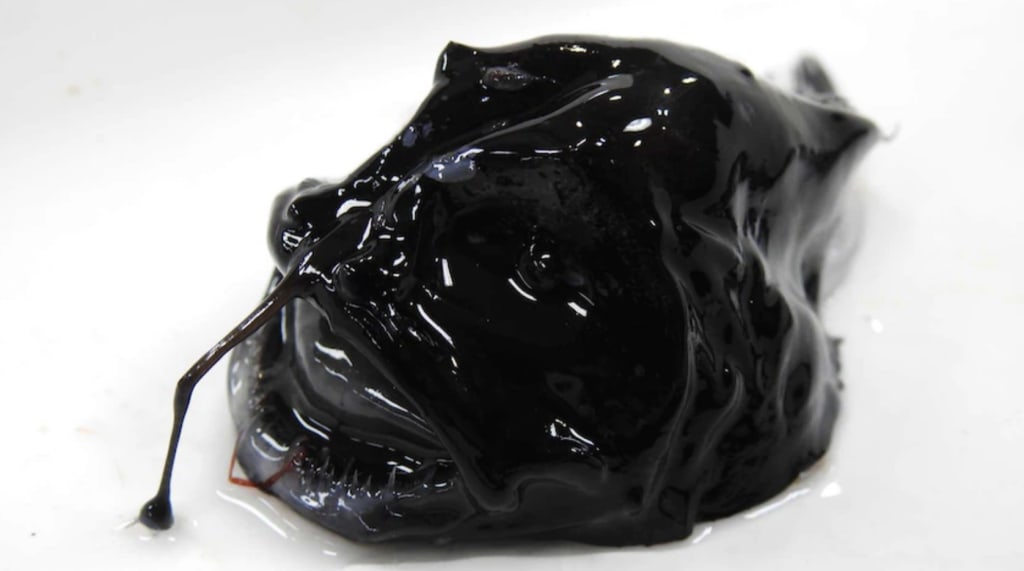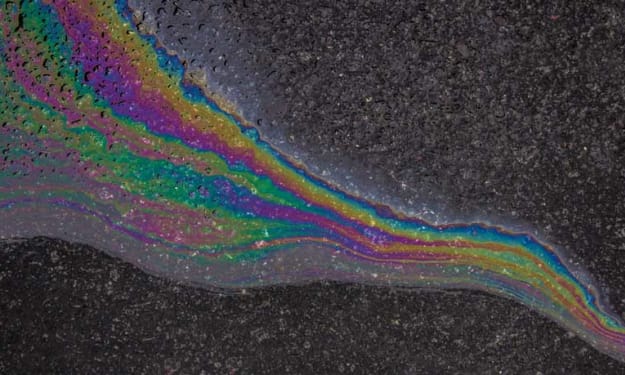Black fish.
Fairy tales of history interrupt an abrupt move.

She stood on the sand watching a handful of children rush onto the shore. The water had pulled back a mile or more from where it usually lapped the shore. Kids had already raced out to pluck up the wet shells greedily, using the bottoms of their t-shirts that they stretched out to use as makeshift bags to collect their treasures among the fish that desperately curled their bodies before slapping the sand in a desperate attempt to push themselves back into the water that had abandoned them. A few of the children picked up the flopping fish in their shirts alongside the shells and clams until they had so many that when they ran back the fish were tumbling out from their wet shirts.
The sky was indiscernible from the slate water that made no visible movement. No swell that might suggest it would try to recover the shore. It sat silent and still. Even the children were too occupied by gathering up their goods to shout and the sound of their foot falls were sucked away by the sand that was still wet enough to silence the evidence of their movement.
An ashy gull landed beside her; the muted beat of its wings like a cry.
Time had broken down. It was a forgotten word now and carried no more meaning or value than dollar bills or kisses from a mother. So, when a child brought her a shirt full of oily fish there was no way to know if the child had been collecting them for a day or for a minute. The boy dropped them at her feet before running out again; the ragged shirt splashed with black stains.
The gull balked at the fish, a croak rather than a squawk erupting from its throat. It's wings dotted with black spots as it flapped them at the fish, sputtering fluid when it failed to croak again.
She picked up a fish where the body and tail pinched into an hourglass. It's sharp, oily scales scratching at her dirty hands. She could almost remember a story about fishes that had eyes like shiny bits of tin.
It slipped out back onto the sand.
A smaller kid was running to the shore from the street above with the old mayonnaise buckets from a forgotten restaurant. They dropped them by her and scooped up the fish; the first few landing with small thuds into the container.
One bucket for fish. One bucket for clams and oysters. One bucket for pretty treasures the ocean had given up.
She grabbed the plastic handle from the fish bucket and tugged it to where the shore met the cracked grey cement. She could see a trail of people already loading large platform dollies.
An older gestured to a small space on a dolly when she reached them and helped her heave it up.
"Something's going to happen." He said and pushed. She followed, toying with her necklace. "It's gonna come back in. Swallow everything up for miles."
Everything on the dollies were in big plastic bins. Green for dirt, dusty red for heating equipment, scratched black for filters, white for seeds, grey for everything else. "Did you bring any ocean water for those?" He asked.
"Didn't know we were leaving."
He grunted, "Not like we don't gotta clean them anyway. A few hours in the sun won't hurt."
Behind her a few olders flagged down the children, dragging them and their buckets up to the road.
"The city will let us stay. I hope it's far enough away."
The city was a community more inland that they often traded with. They were the guards for the Tree. Every new day one person got to visit the tree. She had visited it once. She was surprised at the roughness of the bark and the stiffness of the leaves. One of the guards said it was an Oak Tree. She kept a russet leaf that had fallen to the ground in her pocket to share with her friends until it splintered and blew away.
They had driven walls deep into the ground surrounding it to keep the poison away. The tree guards were in charge of making sure it had clean compost and water. They had built a plastic top that hovered far over it suspended from each corner by steel rope tied to abandoned balconies to keep it mostly isolated from the burning rain and draped a tarp from the plastic top to the walls to protect it from any rain that would blow sideways. No one dared try to climb the walls. Everyone had their turn. The only way to lose your turn was to be a problem. When she had been smaller she never knew where the problem people went, the few in her life that she knew, but now she knew.
It was uphill to the city community. The city people referred them to an empty house. They unloaded their water filtration and heating stations in the backyard. It was typical; a spacious slab of concrete and stone encased by two layers of netting a few feet from each other to save their skin from the irritation from the rain and an awning to protect their filtration, cleaning, and heating stations.
When the little ones came in she abandoned left the stations to tend to them. Their hands were black and slick from catching the fish and oysters. They were already trading their shells with the city littles for various toys and books.
"Margie traded me this," one said proudly, waving a book.
"Did Margie do that?" She played along. She took a rag sitting on the table and rubbed some of the oil of the child's hand and tried to erase the black smudges on the book.
The little pulled her hands away from the rag and snatched the book.
"You're going to look at it with me." She grabbed her by the wrist and took her up a flight of stairs to find a room with a mattress. They sat on it, leaning against the wall.
"Margie said this is how it used to be." The child pointed to a picture of person sitting under a tree eating a green ball with dozens more green balls with little leafs attached to them.
She laughed, "Is that so? Are they eating those things?"
"Apple." The child said, point to the word on the page. "It's called an apple and they grow on trees."
"Have you ever seen an apple on the city tree?"
"There used to be dozens of trees" they argued.
"Hmm,"
"And you could eat them. Anytime you wanted. Just pull an apple off."
"Well, Margie sure got you a good fairy story."
"It isn't a fairy story. It's real." The child rested their head on her chest. "And you could grow food straight from the ground." They pointed in another picture.
"What's the next page? The little being thrown in the compost pit?"
"No." They flipped the page to reveal a picture of a little surrounded by blue specks falling from the sky. "When it rained it didn't make your skin red. That was what the food ate."
"Better the food than us, huh?"
"Margie said that the lady to made her alive had a lady who made her alive and it went back and back."
She nodded listening.
"And one of those olders, way, way back, they had stuck their tongue out in the rain and drank it. And they had dozens and they took these red strawberries straight from the ground outside. They didn't even need to use buckets to keep their dirt in."
"If they didn't keep their dirt in buckets how are they supposed to keep the poison and rain out?"
"It was a long time ago." The child lifted their head and looked at her. "They have a big library here with lots of these books. Margie said we can go and look about the things that came before us. History."
"Sure."
The child reached to her chest and used their thumb nail to open the little heart shaped locket. "I bet these people ate apples straight from trees."
She lifted the silver string and looked at the tiny picture of two people. "Yeah, maybe. A thousand years ago." She smiled and kissed the child's head. "Whenever you want, I'll come with you." She snapped the locket shut. "When I was littler I just traded things for pretty pieces around my neck. You put pretty things right inside your head."
"We aren't going back, are we?"
"I don't know. The water was pretty far back. It's going to be a big swell when it returns." She shrugged, "The city people like us."
"I thought the fish would be less slimy if they were further in the ocean."
"All fish are slimy."
"I bet when people lived when there were apples on trees they weren't."
"Why don't you go find Margie? You can get a head start on that history and I'll help clean up all that fish you littles got us, huh? We need more pretty stories for you to tell us."
The child nodded and tucked the book under their arm before walking down being followed by the elder.
On the patio they had nearly set up and were slicing open the fish on a plastic table. Bits of blue and white were pushed out before they extracted little pin bones and sorted the garbage and the bones separately. One bin for trash. One bin to clean for broth. The meat was dumped into a metal pot over a fire pit.
There was a creaking in the distance and she could see the olders frown at it while they kept themselves busy cleaning the fish and filtering the water.
"The city people are happy to have us." The older she had walked with told her. "Their dirt is going bad. We'll help them rebuild their greenhouse; the rain finally burned through the roof. We'll go out tomorrow, help them find pieces to restore it. I think their dirt will be okay."
"Hope so. We don't have much dirt ourselves."
"We'll have to figure it out." He said. "Got lots of leaves composting. Some of the city people went down to bring up more of our supply. They've got a few more houses so we're not cramped in here."
She grabbed a fish and started cleaning next to him. "They are really good to the littles here."
"Yeah." He coughed, wiping away the brown fluid that came from his throat onto his sleeve, "They like that library."
She looked down at the fish and imagined what it would look like if wasn't black and oily. With one of the rags she tried to clear some off, but it only seeped back up. She knew after boiling the black wasn't so dark; when all the oil floated to a thick layer on the top.
"Don't dwell on it too much." He forced a smile, "You're still a bit little, too, aren't you?"
"Sucker for those fairy stories."
"Aren't we all?" He said, "I remember stories of days. There was one bit that was golden of time and everything was illuminated not like fire, but in a way where you could see everything clearly. And another part where everyone slept at the same time: night. When you combined the light part and the not light part it was called a day."
She laughed at the thought of anything not the same dullness at all times. At people sleeping all at once and being awake all at once. "That doesn't really make any sense, does it?"
He shrugged, smirking, "Sucker for those fairy stories," he repeated
They kept the fish in their hands, looking up as though they could see the source of the moaning from the ocean.
"It's going to be something when it comes back in." He muttered. He looked at her and forced a smile, "Let's hope we get some more fairy stories from the littles to distract us."
About the Creator
MJ Shanard
Once I was born.






Comments
There are no comments for this story
Be the first to respond and start the conversation.